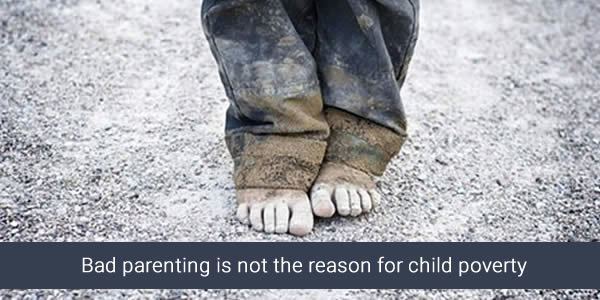The single most effective action we can take to improve the lives of children in poverty is to give parents money, no questions asked. In two previous articles, I’ve shown that when parents in poverty are given more money, they use it to better the lives of their children.
Read more:
I suspect that many in New Zealand will express both shock and total disbelief that the evidence could possibly support this conclusion. At the heart of this shock is the common belief that children in poverty suffer because of bad parents, not the lack of money.
In part we believe this myth because our focus on “child” poverty has separated in the public’s mind these children from their families. The children are innocent and need our help therefore we glibly conclude that the parents are “guilty”: guilty of ignorance and abandonment of their parental responsibilities. New Zealanders love to perpetuate the image of the “mad, bad, poor parent”, but it is a lazy, inaccurate and dangerous story to tell because it has led us to put our best efforts into the least-efficient solutions.
We want to help the children but we don’t want to help their parents. We see it as their fault. So we don’t. Instead we continue to push solo parents into work even though it does no good for the kids unless both the work and childcare are of a decent quality. We feed children in schools, but a couple of Weetbix won’t fix their problems. We talk about providing minimum standards for children in housing, but why are families in poverty not able to afford decent accommodation for their children? We are treating the symptoms (children doing badly) and never the cause (family poverty) because we do not trust parents in poverty to do the best for their children.
We need to deal with what is really at the heart of poor outcomes for children in poverty: lack of resources in a family and a life filled with stress.
In the first article of this series, I looked at the “The Great Smoky Mountains Study”, where some families in poverty received a regular cash grant, and the children in those families prospered in the long term.
The families who were moved out of poverty with the regular payments displayed fewer stress-related behaviours. They had fewer arrests, had more quality time with their children, improved their parenting behaviours, while the children themselves were happier, stayed in school longer, and committed less crime, compared with poor families in Smoky Mountains who did not receive the payments.
Child poverty is a growing problem in New Zealand.
Stress from poverty even impacts the developing brains and bodies of children – an impact that lasts a lifetime. This can occur if children personally face ongoing stress or if they experience a lack of adult interaction in key development phases. An Otago University study followed a large group of Dunedin children since their birth in the 1970s and found that growing up in poverty increases the chance of heart disease in life. Importantly, even if the child became wealthy as an adult this risk didn’t disappear – showing the permanent physical impact of poverty-related stress.
Families in poverty have less to spend on both the basics and the enriching experiences children need to thrive. There is some evidence that an inability to purchase goods and experiences also leads to poor outcomes for children.
In reality, stress and limited resources interact with each other to determine children’s well-being. Take learning to read, for example. A family who can’t afford to buy books for children may also have less time, ability and energy to read to their child. We know that being read to is crucial for later learning, so this problem creates a gulf in skills between the haves and have-nots that no school can hope to bridge.
What the evidence tells us is that children in poverty do poorly not because they have irresponsible parents, but because they live in families under stress. Give them money to release the pressure valve and families and children do a whole lot better. It is not 100 per cent effective of course, but it gets closer than anything else we have tried.
First, we need to remove the financial stress then we deal with what is left.

